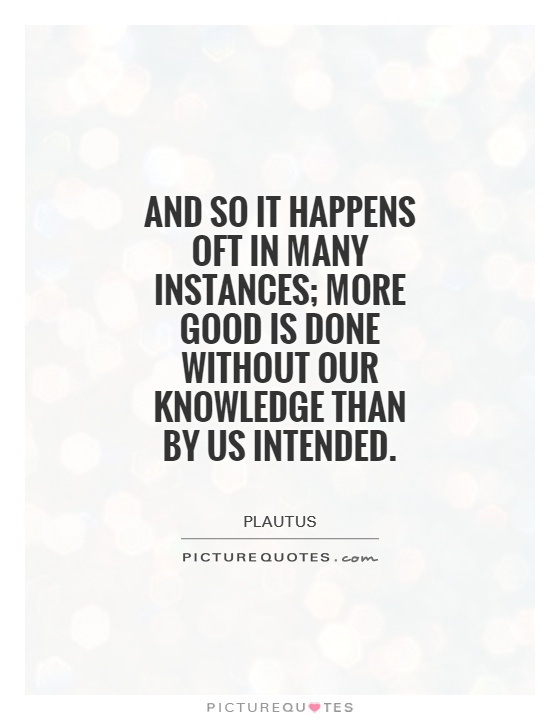And so it happens oft in many instances; more good is done without our knowledge than by us intended

And so it happens oft in many instances; more good is done without our knowledge than by us intended
In the context of Plautus, the quote "And so it happens oft in many instances; more good is done without our knowledge than by us intended" holds true in many of his plays. Plautus, a Roman playwright known for his comedic works, often explores themes of mistaken identity, misunderstandings, and the unintended consequences of characters' actions. In many instances, characters in his plays end up doing more good than they realize, despite their original intentions.One of the most famous examples of this theme in Plautus' works is found in his play "The Menaechmi." In this play, two identical twins, Menaechmus of Epidamnus and Menaechmus of Syracuse, are separated at a young age and grow up in different cities. Through a series of misunderstandings and mistaken identities, the two twins end up crossing paths in the same city. Despite their initial confusion and frustration, their chance encounter ultimately leads to a happy resolution, as they are reunited with their long-lost family members and loved ones.
Another example of unintended good in Plautus' plays can be seen in "The Pot of Gold." In this play, a miserly old man named Euclio discovers a pot of gold buried in his backyard. Instead of using the gold to improve his own life, Euclio becomes paranoid and obsessed with protecting his newfound wealth. However, his actions inadvertently lead to the reconciliation of his daughter with her lover, as well as the exposure of a corrupt politician. In the end, Euclio's unintentional good deeds result in a happier outcome for those around him.
Overall, Plautus' works often highlight the idea that more good can be done without our knowledge than by us intended. Through his comedic storytelling and exploration of human nature, Plautus demonstrates that sometimes the best outcomes come from unexpected sources and actions. In the world of Plautus, misunderstandings and mishaps can lead to positive outcomes, showing that even the most bumbling characters can inadvertently bring about good in the end.












 Friendship Quotes
Friendship Quotes Love Quotes
Love Quotes Life Quotes
Life Quotes Funny Quotes
Funny Quotes Motivational Quotes
Motivational Quotes Inspirational Quotes
Inspirational Quotes